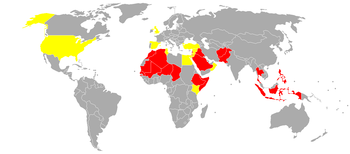
For months after his inauguration, US president Donald Trump bragged that he was single-handedly producing an economic boom, citing a rising stock market as evidence.
Recently, however, he’s stopped that line of self-promotion. The market has seemingly gone nuts. Sudden one-day drops pare back weeks of gains, followed by a cautious recovery of the lost ground. There’s a strong correlation between those swings and Trump’s mouth, whether he’s making formal policy announcements or just tweetstorming his latest obsession.
To understand the problem, let’s look to the seemingly unrelated fields of economics and physics.
In a 1997 paper on the Great Depression, Austrian School economist Robert Higgs articulates his theory of “regime uncertainty.” Simply put (if I get this wrong, blame me, not Higgs), investors dislike unpredictability.
Investors put their money into enterprises under certain tax and regulatory conditions. When those conditions start suddenly changing or looking like they may change, the investors worry. And when they worry, they get more cautious about where their money is and what it’s being used for. They sell off, move their money into what they hope are less volatile assets, and the stock market takes a hit.
German physicist Werner Heisenberg studied uncertainty too, and likewise named a principle for it. Again simply put (and again, blame me, not Heisenberg, if I get this wrong), there are limits to what we can know about multiple aspects of things. Specifically, we cannot precisely determine both the position and the momentum of a particle at a particular moment. The more certain we are about one, the less certain we are about the other.
Donald Trump resembles one of Heisenberg’s particles. Sometimes we know where he’s at on an issue for the moment, but we needn’t bother trying to predict how fast he’s going to move or in what direction. He may double down, or he may turn 180 degrees.
One minute he’s demanding that regulations be slashed. The next minute, he’s nixing multi-billion-dollar aircraft deals over foreign policy. First it’s tax reform and tax cuts. Then suddenly it’s imposing new taxes — tariffs — on steel and aluminum.
This is not to say that any particular idea or policy he comes up with is bad, although some of them obviously are. What matters to investors is predictability.
If there’s one predictable characteristic of Trump, it’s that he is, and will remain, unpredictable. That unpredictability can only produce negative economic consequences.
Thomas L. Knapp (Twitter: @thomaslknapp) is director and senior news analyst at the William Lloyd Garrison Center for Libertarian Advocacy Journalism (thegarrisoncenter.org). He lives and works in north central Florida.
PUBLICATION/CITATION HISTORY
- “Uncertainty is the root of current market craziness,” by Thomas L. Knapp, Winchester, Tennessee Herald Chronicle, 04/03/18
- “Uncertainty is the Root of the Current Market Craziness,” by Thomas L. Knapp, CounterPunch, 04/04/18
- “Uncertainty is at root of the current market craziness,” by Thomas L. Knapp, Claremont, New Hampshire Eagle Times, 04/05/18
- “Uncertainty is the Root of the Current Market Craziness,” by Thomas L. Knapp, Ventura County, California Citizens Journal, 04/05/18
- “Uncertainty is the root of the current market craziness,” by Thomas L. Knapp, Fayette, West Virginia Tribune, 04/09/18
- “Uncertainty is the root of the current market craziness,” by Thomas L. Knapp, Montgomery, West Virginia Herald, 04/09/18
- “Uncertainty is the root of current market craziness,” by Thomas L. Knapp, Uintah Basin, Utah Standard/Vernal Express [web edition and one print edition], 04/10/18
- “An economic age of uncertainty,” by Thomas L. Knapp, Pasco/Pinellas Suncoast News, 04/11/18
- “Uncertainty is root of market craziness,” by Thomas L. Knapp, Pahrump Valley, Nevada Times, 04/13/18
- “Uncertainty is the root of current market craziness,” by Thomas L. Knapp, St. George, Utah Daily Spectrum, 04/28/18
- “Uncertainty is the root of current market craziness,” by Thomas L. Knapp, Fort Collins, Colorado Coloradoan, 04/28/18
- “Uncertainty is the root of current market craziness,” by Thomas L. Knapp, USA Today, 04/28/18
- “Uncertainty is the root of current market craziness,” by Thomas L. Knapp, Fon du Lac, Wisconsin Reporter, 04/28/18
- “Uncertainty is the root of current market craziness,” by Thomas L. Knapp, Detroit, Michigan Free Press, 04/28/18
- “Uncertainty is the root of current market craziness,” by Thomas L. Knapp, The Arizona Republic, 04/28/18
- “Uncertainty is the root of current market craziness,” by Thomas L. Knapp, Nashville, Tennessee Tennessean, 04/28/18
- “Uncertainty is the root of current market craziness,” by Thomas L. Knapp, El Paso, Texas Times, 04/28/18
- “Uncertainty is the root of current market craziness,” by Thomas L. Knapp, Rochester, New York Democrat & Chronicle, 04/28/18
- “Uncertainty is the root of current market craziness,” by Thomas L. Knapp, Milwaukee, Wisconsin Journal Sentinel, 04/28/18
- “Uncertainty is the root of current market craziness,” by Thomas L. Knapp, Indianapolis, Indiana Star, 04/28/18
- “Uncertainty is the root of current market craziness,” by Thomas L. Knapp, Cincinnati, Ohio Enquirer, 04/28/18
- “Uncertainty is the root of current market craziness,” by Thomas L. Knapp, Des Moines, Iowa Register, 04/28/18
- “Uncertainty is the root of current market craziness,” by Thomas L. Knapp, Reno, Nevada Gazette Journal, 04/28/18


